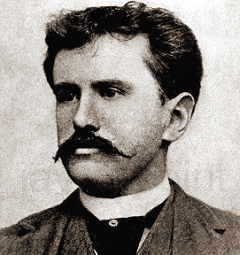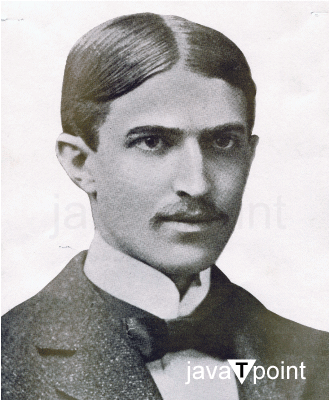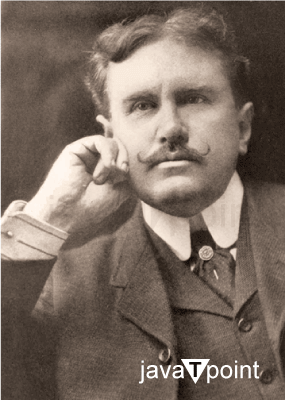O Henry
O. Henry was a famous American writer who used the pen name William Sydney Porter. He was known for writing clever and funny short stories in the late 1800s and early 1900s. He was born on September 11, 1862, in Greensboro, North Carolina. His life had both good and tough times. He became a writer when he lived in New York City and had different jobs, like working in a pharmacy, a bank, and as a journalist. He called himself "O. Henry" to keep his real name a secret while writing for newspapers and magazines. His stories often had surprising endings, tricky wordplay, and a deep understanding of people. One of his most famous stories is "The Gift of the Magi," about love and giving. People loved how he could express feelings and important ideas quickly. His stories often showed how regular people struggled and dreamed, which made them easy for everyone to relate to. Even though O. Henry did well as a writer, his personal life had some problems. He went to jail for stealing money. But being in jail gave him more time to get better at writing. O. Henry's stories are still popular today. They make readers laugh, think, and understand life better. He died on June 5, 1910, but his stories keep inspiring and entertaining people worldwide. Early LifeWilliam Sidney Porter was born on September 11, 1862, in Greensboro, North Carolina. Later in life, he changed the spelling of his middle name to Sydney, and his parents were Algernon Sidney Porter, a doctor, and Mary Jane Virginia Swaim Porter. William's parents got married in 1858, and when he was just three years old, his mom passed away after having another baby. So, he and his dad went to live with his grandma. As a kid, Porter loved reading all kinds of books, from old ones to cheap adventure stories. Lane's translation of One Thousand and One Nights and Burton's Anatomy of Melancholy were his favorites. 
He finished elementary school at his aunt Evelina Maria Porter's school in 1876 and then went to Lindsey Street High School. His aunt kept teaching him until he turned 15. In 1879, he started working at his uncle's drugstore in Greensboro, and on August 30, 1881, when he was 19, he became a licensed pharmacist. While working at the drugstore, he also showed off his artistic talents by drawing pictures of the people in town. Moved to TexasHe went on a trip with his friend Richard to Austin, Texas, in 1884. He liked it so much that he decided to stay there. He found a warm welcome at Richard's friends' house, Joseph Harrell and his wife. Porter lived with the Harrells for three years. He briefly worked as a pharmacist at the Morley Brothers Drug Company and later moved to the Harrell Cigar Store in the Driskill Hotel. During this time, he also started writing stories as a hobby, writing many of them while staying at the Harrells' place. As a young bachelor, Porter had a busy social life in Austin. He was known for his cleverness, storytelling, and musical skills. He could play the guitar and mandolin and even sang in the St. David's Episcopal Church choir. He joined a group of young men called the "Hill City Quartette," they used to sing at gatherings and serenade young women in the town. MarriagePorter met a young lady named Athol Estes, who was 17 years old and came from a rich family. People think they first crossed paths at an event where they were laying the cornerstone of the Texas State Capitol on March 2, 1885. Athol's mom didn't like being together because Athol was sick with tuberculosis. On July 1, 1887, Porter and Athol secretly got married. They had their wedding in the living room of Reverend R. K. Smoot's house. He was the pastor of the Central Presbyterian Church, which Athol's family attended. Even after getting married, Porter and Athol continued doing music and acting in theatre groups. Athol was supportive of Porter's writing. They had a baby in 1888, but sadly, it passed away just a few hours after birth. Then, in September 1889, they had a daughter named Margaret Worth Porter. Porter's friend Richard Hall got a job as the Texas Land Commissioner and offered Porter a job, too. Porter started working at the Texas General Land Office (GLO) on January 12, 1887. He was a draftsman, drawing maps from surveys and notes about the land. His salary was $100 a month, enough to care for his family. But he still kept writing for magazines and newspapers. While working at the GLO, he started developing ideas for his stories, like "Georgia's Ruling" in 1900 and "Buried Treasure" in 1908. The GLO building where he worked inspired some of his stories, like "Bexar Scrip No. 2692" in 1894. Porter's job at the GLO was a political job that Richard Hall helped him get. Hall ran for governor in 1890 but didn't win. So, on January 21, 1891, Porter quit his job the day after the new governor, Jim Hogg, started his job. 
Henry' ArrestIn 1895, Porter and his family moved to Houston. He got a job at the Post newspaper, where he initially earned $25 per month, but his pay went up as more people liked his writing. He came up with ideas for his stories by hanging out in hotel lobbies and watching and talking to people there. He kept doing this throughout his writing career. While he was in Houston, government investigators checked the First National Bank of Austin's finances and found that money was missing because of theft. As a result, he lost his job. He was also charged with the crime of stealing money, and the government arrested him. After he was arrested, Porter's father-in-law paid to get him out of jail. He was supposed to go on trial on July 7, 1896, but the day before, as he was changing trains to go to the courthouse, he got scared and ran away. First, he went to New Orleans, and later, he went to Honduras, a country where the United States couldn't make him return because there was no agreement between the two countries. He lived in Honduras for about six months until January 1897. While there, he became friends with a famous train robber named Al Jennings, who later wrote a book about their friendship. Porter stayed in a hotel in Trujillo, Honduras, where he wrote a book called "Cabbages and Kings." Porter had sent his wife Athol and their daughter Margaret back to live with Athol's parents in Austin, Texas. Unfortunately, Athol got very sick and couldn't meet Porter in Honduras as they had planned. When Porter discovered his wife was dying, he returned to Austin in February 1897 and turned himself into court, knowing he would have to go to trial. Athol Estes Porter passed away from tuberculosis on July 25, 1897. At his trial, Porter didn't have much to say in his defense, and he was found guilty on February 17, 1898, of stealing $854.08. He was given a five-year prison sentence and put in the Ohio Penitentiary in Columbus, Ohio, on March 25, 1898. Porter was a licensed pharmacist and worked in the prison hospital as a night druggist. His room was in the hospital wing, and there was no record of him spending time in the regular prison cells. While he was in prison, he had 14 stories published under different names, but he started to become famous as "O. Henry," a name that first appeared in a story called "Whistling Dick's Christmas Stocking" in the December 1899 issue of McClure's Magazine. A friend in New Orleans helped send his stories to publishers so they didn't know he was in prison. Porter was released from prison on July 24, 1901, because he behaved well there and served three years of his sentence. He reunited with his daughter Margaret, who was now 11 years old, in Pittsburgh, Pennsylvania, where Athol's parents had moved after Porter was convicted. DeathPorter drank a lot, and by 1908, his health got much worse, and it started to impact his writing. On June 5, 1910, he passed away because of problems with his liver, diabetes, and a big heart. Some say he also had bleeding in his brain that caused his death. ConclusionO. Henry was a famous American writer, but his life was full of ups and downs. He was good at writing funny and smart short stories, but he had a big problem with drinking too much, which made him sick and affected his writing as he got older. He passed away on June 5, 1910, and some say it was because of a bleeding in his brain. Even though he faced many challenges, he's still remembered for his funny and insightful stories about everyday life in America.
Next TopicAditi Raval Biography
|
 For Videos Join Our Youtube Channel: Join Now
For Videos Join Our Youtube Channel: Join Now
Feedback
- Send your Feedback to [email protected]
Help Others, Please Share









